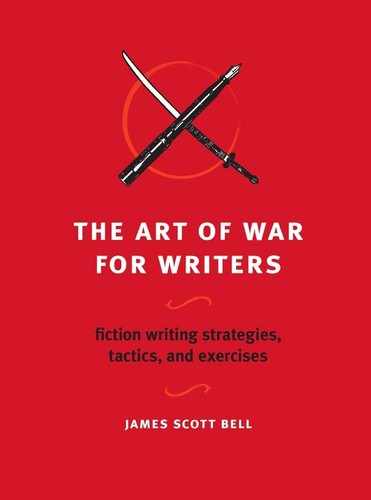
114
34
When you are stuck,
call on a word and its cousins.
As Sun Tzu said, the conditions of war are like water
fl owing over the ground. No constancy of form, so you
have to be able to adapt.
Writing is like that. And that’s a good thing. The fl ow
keeps you from becoming formulaic. You need to train
yourself to look for the new and the fresh at every critical
stage of your writing.
Sometimes you’ll get stuck. When that happens, I
use a pocket thesaurus.
Say I’m writing about my character’s background.
I need to know what her father did for a living. I pull
out my thesaurus, open to a page at random, and take
the fi rst word my eyes fall upon. I read that word and
all the synonyms. Invariably, I get a web of pictures and
possibilities for whatever I’m looking for, in this case a
profession for the father.
For example, I just opened to the word fugitive. I see
the defi nition, one who fl ees confi nement, captivity, or
justice, and synonyms like escapee, refugee, runaway. How
about if my lead character’s father is a bounty hunter?
Or a prison guard? Or maybe even a real fugitive living
under an assumed name? Or running away from a past
Z4273i_100-126.indd 114Z4273i_100-126.indd 114 9/24/09 11:21:01 AM9/24/09 11:21:01 AM

115
that may have included incarceration? All possibilities I
can sift through, and I can keep going, making the list
longer, which is always a good thing.
Or, let’s say I have a scene where my character is re-
fl ecting on the events swirling around her, and I need
some sort of action to take place to keep the scene from
being overly introspective. I open to the word peanuts.
There is a slang entry that says, “a small or trifling
amount of money, as in he sold his car for peanuts.” And
the synonym chicken food.
Maybe my character is outside a park carnival and
a guy tries to sell her some peanuts (or a chicken!) and
won’t go away. Why won’t he go away? Why is he selling
chickens out here? Maybe he becomes an intriguing sec-
ondary character.
Or maybe she’s thinking about the need to get some
money, and she wants to sell her car, but it’s only worth
peanuts. Why is her car only worth peanuts? Why didn’t she
have a better car? What does this tell me about her life?
And so on as far as I want to go. I will even use this
technique when I’m in the middle of writing a scene and
I need the dialogue to take an unexpected turn.
Whenever you fi nd yourself with a little bit of writer’s
stuckness, whip out your thesaurus and look up a word.
Let whatever happens in your mind happen. You will fi nd
a way to relate it to your story.
Z4273i_100-126.indd 115Z4273i_100-126.indd 115 9/24/09 11:21:01 AM9/24/09 11:21:01 AM
..................Content has been hidden....................
You can't read the all page of ebook, please click here login for view all page.
